As brands around the world continue to rely on social media to reach their target audience, there is an increasing need for social media managers.
In this guide, you’ll learn how to become a social media manager with no experience. I will break down all the skills you need to develop, where to look for work, and how to best position yourself to land consistent clients.
What does a Social Media Manager do?
Social media managers have a variety of responsibilities when it comes to marketing and building a brand’s online presence. This includes:
Social Listening
Social listening involves monitoring the needs and perceptions of your audience around the web. It also requires social media managers to monitor their brand’s reputation online to be able to quickly solve any issues that affect the image of the company.
Social Influencing
Another important responsibility of social media managers, social influencing consists of establishing the authority of your brand across different social channels. This is usually done through creating, distributing, and sharing valuable and engaging content.
Social Networking
As a social media manager, you will need to find and connect with influential and authoritative figures and brands in your target market. This allows you to reach a larger audience while also strengthening the reputation of your own brand.
Social Selling
Social selling allows you to turn the interest you generate for your brand into a steady flow of leads and customers.
If you are managing an eCommerce business, you can even sell products directly on many social platforms like Instagram and Facebook.
Day to day tasks of a social media manager
Here are some of the common tasks involved in managing a brand’s social media presence.
- Scheduling posts
- Setting up profiles
- Creating graphics
- Responding to customer service inquiries
- Finding relevant content to share
- Optimizing profiles and posts for organic reach
- Reporting reach, traffic, and other important metrics to important parties
Social media managers can specialize in their services and do not necessarily need to provide everything on this list but they should be competent enough to give clients a robust service worth the investment.
Clients want to keep things as efficient as possible and do not want to hire a handful of social media managers just to handle basic tasks.
What skills does a social media manager need?
To effectively fulfill all these responsibilities, social media managers need to develop a variety of different skills.
Here are some of the most important skills you will need to become a social media manager:
Copywriting
Social media managers need to do a lot of writing to communicate their brand’s message with their target audience. This makes it important to develop your copywriting skills to be able to write concise copy that grabs your audience’s attention and elicits an emotional response.
Graphic design
Visual content is essential for grabbing your audience’s attention and getting them to engage with your brand. As such, the ability to create stunning graphics is an important part of being a social media manager.
Customer service
Customer service skills are a big part of being a social media manager as they allow you to understand your customers’ concerns and communicate with them on a deeper level.
Customers often have questions, and many tend to turn to social media accounts either in the comments of posts or direct messaging to find answers.
Research skills
As a social media manager, you need to be up to date with all the news and trends related to social media and the digital world. This will allow you to ensure your strategy is best suited for success and that you are not missing out on any new opportunities.
Social Media Manager Salary
How much do Social Media Managers Make?
Social media managers across the world tend to earn a solid income. The amount you can make will depend on your location and level of experience.
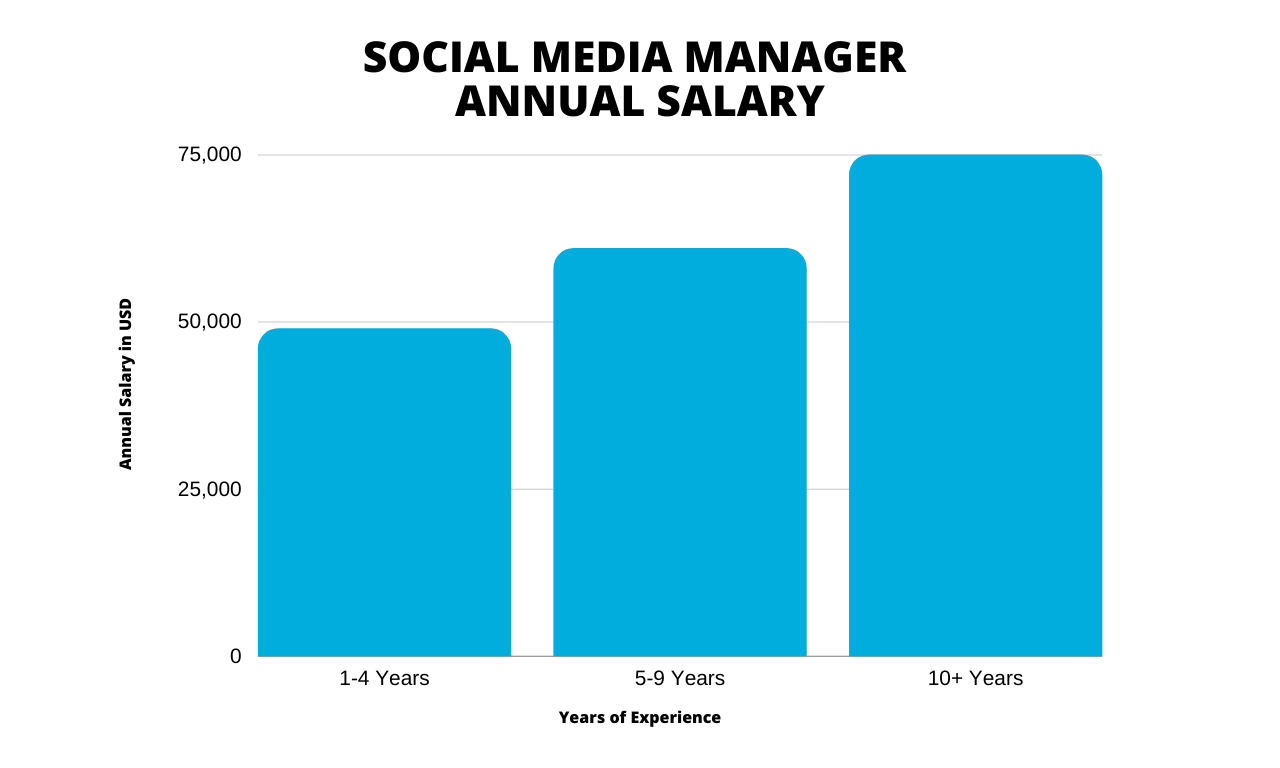
The average annual salary in the US for social media specialists in 2020 is $62,750
The average annual salary in the US or social media managers in 2020 is $75,750
Like salaried employees, the amount you can earn as a freelance social media manager will vary based on experience.
Less experienced freelancers can earn anywhere between $15 and $50 per hour while intermediate freelancers can make between $50 and $100 per hour.
Resources to Learn More
- How much do digital marketers make? A study analyzing the salaries of popular digital marketing jobs, including social media specialists and social media managers.
How to Become a Social Media Manager
- Learn Social Media Marketing
- Build Your Social Media Presence
- Create Business Accounts On Major Social Platforms
- Get A Social Media Manager Specialist Job
- Build Your Manager Skills
- Define Your Services
- Learn How To Use Social Media Marketing Tools
- Build Your Client Portfolio
- Apply For Social Media Manager Jobs
- Start Your Own Social Media Marketing Agency
- Become A Social Media Freelancer
1. Learn Social Media Marketing
Being successful as a social media manager requires constant learning.
Beyond developing the skills needed to perform the duties of a social media manager, you need to learn the ins and outs of the different social media platforms.
This means mastering the ability to manage both paid promotions and organic outreach on social media channels.
Paid advertising provides a huge opportunity for businesses to reach their target audience and grow their customer base while earning a high return on their investment.
SEO is also important for social media platforms as most function as a search engine of their own. Knowing how to perform keyword research and how to structure your social media content can help you reach a highly relevant audience.
The best way to learn social media marketing and gain the skills needed to run both PPC and organic campaigns effectively is to follow a social media marketing course.
A good course will teach you how to run PPC campaigns without wasting your budget and how to design a social media marketing strategy to take advantage of all available social media channels.
Each platform offers a unique user base and works best with different types of content.
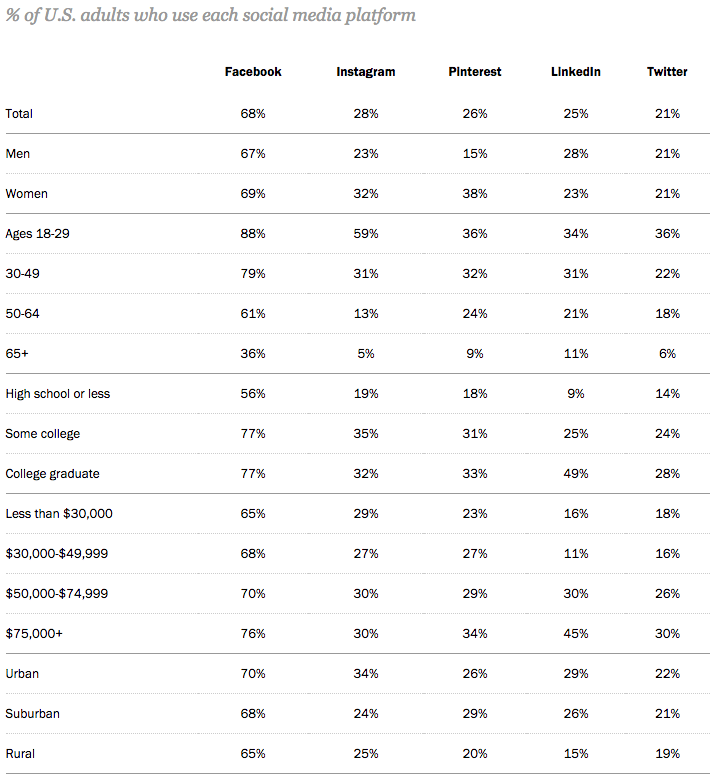
The main platforms you will need to master as a social media manager include:
Facebook is a wildly popular social media platform with over 2.5 billion active users. Naturally, it has become a prime marketing asset for all sorts of businesses.
Creating business pages, joining groups, and running paid advertisements are the most common ways to connect and engage with your target audience on the platform.
Instagram allows users to post images and short videos accompanied by comments. Nearly half of all Instagram users are following at least one business and the platform is a popular outlet for learning about brands and products.
LinkedIn is a social network geared towards professionals. Users are focused on business, networking, and high-value and authoritative content like long-form blog posts and thought leadership articles.
The user base consists primarily of an older age group and there are more professionals in high-level positions than on any other platform.
Twitter isn’t as big as Facebook or Instagram but it is still a great tool when it comes to marketing.
The platform is more popular among millennials and is another go-to choice for people looking to learn about brands and businesses.
Pinterest is another image-based platform that functions similar to a search engine.
People use the platform to learn more about their interests, hobbies, and the products they want to buy.
Pinterest’s largest demographic is women with higher incomes and that platform drives a much higher return on investment than other social channels.
2. Build Your Social Media Presence
The best way to develop your abilities as a social media manager is through your own profiles. Your own profiles also provide an effective way to find new clients.
By building a strong online presence you can use your own accounts to display your skills and social media prowess to potential clients.
Whether you plan to work as a freelancer or hold a position with a company, you should create profiles listing your social media services on all the major platforms including Facebook, Twitter, Pinterest, Instagram, and LinkedIn.
You can also use your own accounts to experiment with new tactics before you try them with your clients’ profiles.
Resources to Learn More
- How to get followers on Facebook – a comprehensive guide to learn how to increase your Facebook fans. Includes a case study.
3. Create Business Accounts on Major Social Platforms
As a social media manager, you will need an effective way to manage multiple client accounts.
All the popular social media platforms offer business accounts that will allow you to keep all your profiles organized.
Business accounts are also important for the safety of your clients as they give you the ability to access their profiles without them having to give you their login credentials or direct access to their accounts.
Creating business accounts for social media platforms is a straightforward process.
With Facebook, for instance, you will go to business.facebook.com to create your Facebook Business Manager account.

Once there, you will provide some basic information about your business and then link your business’ Facebook page. You will then link any existing Ads Manager accounts so you can manage your paid promotions directly from the Business Manager.
You can add team members to your Business Manager, assigning them different permissions to help you manage your accounts.
With your Business Manager account in place, clients can simply grant you access to their pages and you will be able to manage all your different accounts in a centralized place.
4. Get A Social Media Manager Specialist Job
Working as a social media specialist can help you get the experience needed to become a successful social media manager. With relevant social media experience under your belt, it will also be easier to find work as a freelancer or to find a job as a manager.
The role of a social media specialist is similar to that of a manager and requires many of the same skills.
You will be responsible for leveraging the different social platforms to drive growth for the companies you work for.
This involves researching the target market to decide which platforms present the best opportunities as well as finding and creating relevant content to share.
As you gain more experience you will understand how to handle accounts for different types of clients, putting you in a position to serve as an effective manager in the future.
5. Build Your Manager Skills
Beyond the industry-specific skills needed to support your social media marketing career, being a manager requires its own set of skills. Some of the important abilities you’ll need to master include:
Communication
As a social media manager, you need to be able to communicate efficiently with both clients and your own team.
This means being able to clearly articulate your social media strategy and the tactics you will use to reach your goals.
The ability to explain your work can help improve your relationships with clients, ensuring your projects go smoothly.
Time management
To manage a successful social media strategy, you need to be able to manage your time effectively.
As a social media manager, you need to plan and structure campaigns while leading and executing them from start to finish.
To do this for multiple projects simultaneously, you need to develop processes and utilize tools to keep all pieces moving in the right order.
Analytical skills
Being able to look over data and use it to make more informed decisions is essential to being a social media manager.
This allows you to optimize your marketing campaigns, both paid and organic, by focusing on what is working and making changes to what is not.
6. Define Your Services
Once you have developed your social media and management skills, you’ll need to decide what services to provide and how much to charge for your work.
It’s a good practice to focus on a few services to start. This will help you master certain areas quicker and it will be easier to win new clients as having a specialization can help improve your credibility.
Some of the services you can choose to specialize in include:
- Paid advertising campaigns
- Graphic design
- Setting up and optimizing profiles
- Customer service and community engagement
- Creating and curating content
7. Learn How To Use Social Media Marketing Tools
Managing several social media accounts for multiple clients is a complicated process.
Fortunately, there are many tools available to help you stay organized and streamline the process.
Here are some of the more popular social media marketing tools you’ll want to learn how to use:
Buffer

Buffer is a popular solution that allows you to schedule posts for every social media platform in advance, all from a single dashboard.
This makes it easy to plan and manage all your content as you can see what you are posting on each social media channel in a single place.
Buffer also provides useful analytics you can use to track the performance of your social media accounts.
HootSuite
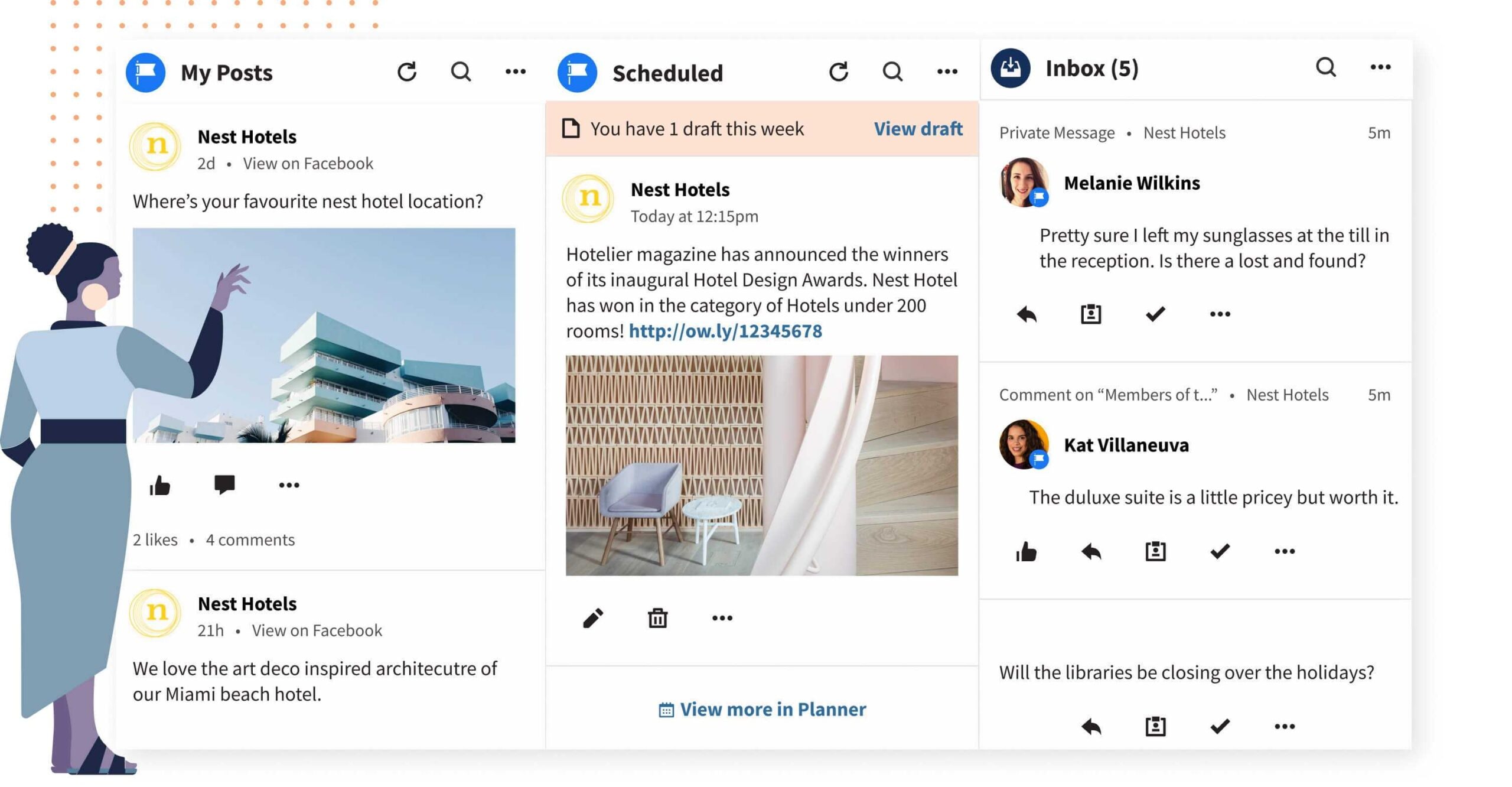
Hootsuite is a comprehensive social media management tool that streamlines the process of managing multiple campaigns. Instead of managing each social account in isolation, you can use Hootsuite to oversee them all from a single dashboard.
The platform allows you to schedule posts, collaborate with your team, and track messages and conversations.
Sendible
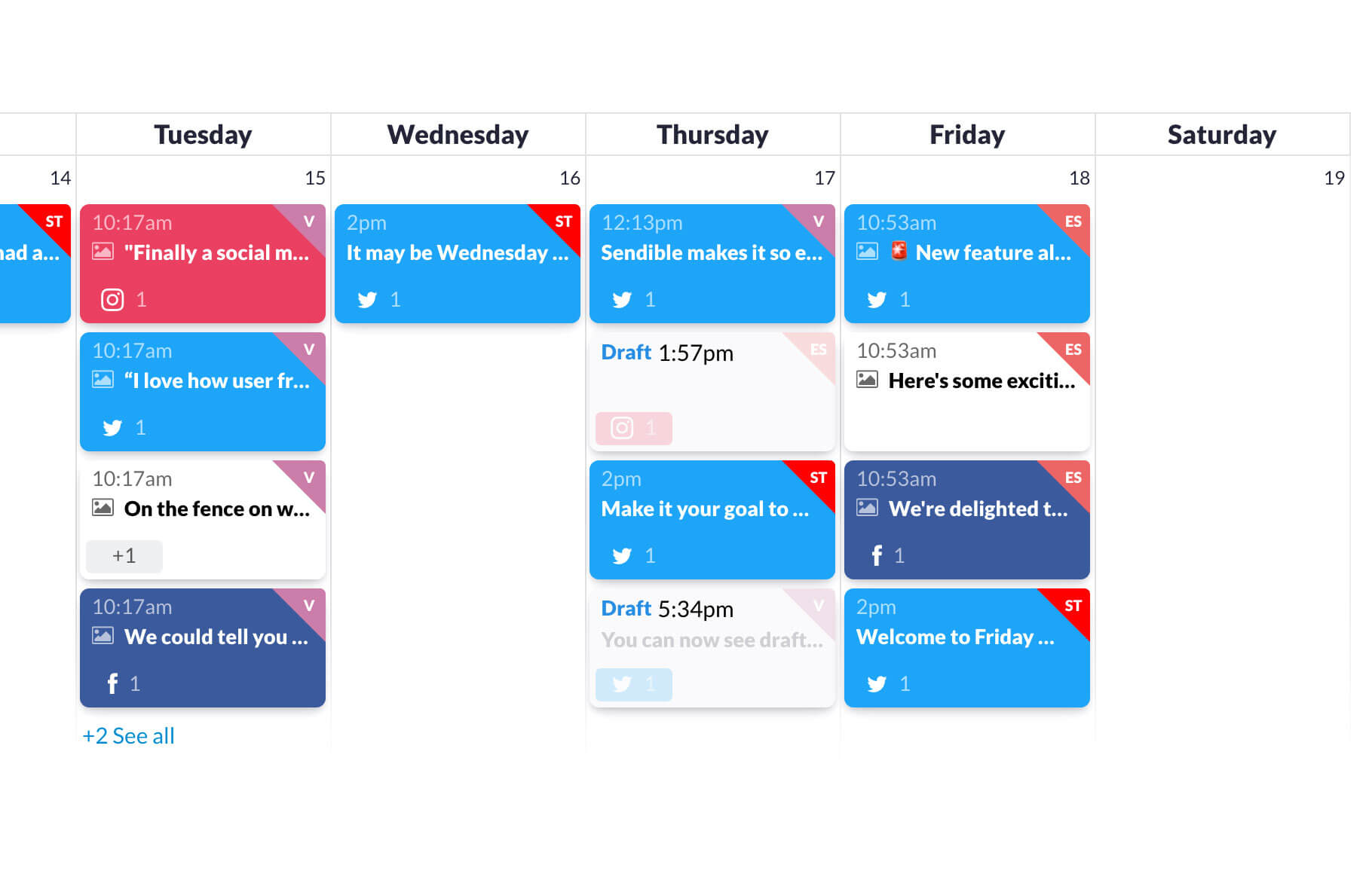
Sendible is a powerful social media management tool for those needing to manage a variety of accounts for multiple clients.
It allows you to schedule posts across the different social media platforms and can be used to create an editorial calendar for your blog.
Sendible also makes it easy to track brand mentions so you can quickly respond to anyone engaging with your brand.
Canva

Canva is a graphic design tool that allows you to create high-quality visual assets for your social media channels.
It is a popular tool for marketers of all skill levels because it is easy to use even if you have less design experience.
Canva is free to use and comes with thousands of design elements you can add to your graphics along with hundreds of pre-made templates to help you get started.
8. Build Your Client Portfolio
Once you win a few clients, you want to build a portfolio highlighting your work so that you can then share with other prospective clients.
Gaining new clients as a social media manager relies heavily on being able to show what you are able to do and how your services can benefit a company.
Building your own online presence can help to a degree but being able to show potential clients the results you have driven for other companies is a powerful way to build your business quickly.
You can also write detailed case studies going into the success of your projects in more detail and add these to your blog.
If you’re wondering how to land your first client without having a portfolio to show there are a few ways to do this.
To start, you can provide voluntary work to a non-profit or a friend. You could also offer your services to clients at a very low price.
This can help you get your first set of clients to get the ball rolling for building your social media management business.
9. Apply For Social Media Manager Jobs
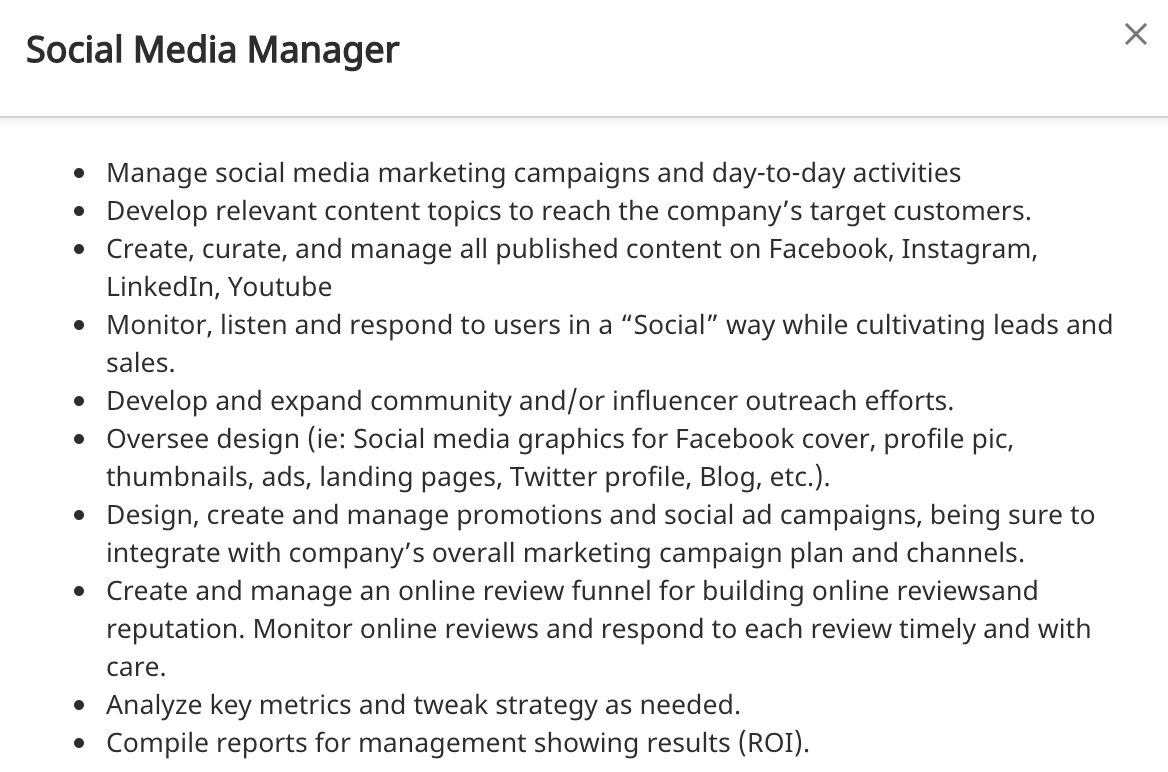
If you are more interested in working in a salaried position than working independently, you can get a job as a social media manager at a company or an agency.
There are plenty of online job boards you can use to find open social media manager positions Some popular options include:
- Indeed
- Glassdoor
- ZipRecruiter
- Google for Jobs
- American Marketing Association
- com
- WeWorkRemotely
- AngelList
You can also leverage your personal network to see if any of your connections can help you secure an open position.
While a college degree is not necessarily required to get a job as a social media manager, it can increase your chances of securing a position significantly. The most popular degrees among social media managers are marketing, communications, or business.
There are also a number of social media marketing certifications you can get to help you stand out from the crowd. This includes courses from platforms like Facebook, Twitter, and LinkedIn as well as popular tools like HootSuite.
Resources to Learn More
- Entry-Level Digital Marketing Jobs – A list of the most popular entry-level marketing jobs (includes salary and job responsibilities).
10. Start Your Own Social Media Marketing Agency
If you want to expand your reach to be able to serve more clients at a time, you can start a social media or a digital marketing agency.
The first decision when setting up your own social media marketing agency is to choose your niche.
You can choose to specialize in a single industry or you can work with clients from a variety of different sectors.
For example, if you work exclusively with clothing companies, you may want to focus on visual channels like Instagram and Pinterest.
However, if your client base consists of B2B companies, you could focus on LinkedIn and Twitter.
Once you have a better understanding of the type of clients you will target and the services you will offer, you need to begin building your team.
The exact build of your team will depend on the services you choose to provide but generally, you will need to find team members versed in each of the different skills areas important to a social media manager working independently. This includes:
- Copywriters
- Graphic designers
- Project managers
- Customer service representatives
- News commentator and curator
By hiring a team of people specializing in the different areas of managing social media accounts, you are able to serve more clients at scale.
A drawback to starting your own agency is that you will have more administrative work compared to operating independently as you will have to oversee all your staff and the business as a whole.
11. Become A Social Media Freelancer
If you don’t want to work with a single company or start your own agency, you can work as a social media freelancer.
As a freelancer, you can find your own clients and choose the services that best suit your interests and talents.
Working independently provides a lot of flexibility as you can set your own schedule and work from anywhere.
However, you’ll need to be able to find and win new clients to ensure a consistent flow of revenue.
Pitching plays a big part in this as knowing how to reach out to potential clients with the value of your services can help you find new work.
There are a variety of freelance platforms you can use to find new clients. Some popular networks include:
- Upwork
- Freelancer
- PeoplePerHour
Key Learnings
Social media experts and managers have a variety of responsibilities including planning and posting content, connecting with influencers and customers, and monitoring what people are saying about the brand across the web.
To perform these duties, social media managers need to develop a number of skills including copywriting, graphic design, research, time management, and communication.
You must learn the ins and outs of each social media platform and the types of audiences that use them.
It is also essential to master different social media tools to plan and manage projects efficiently.
No matter how you choose to start your social media marketing career, you should first build your own profiles. This will help you refine skills and build your online presence.
You can then showcase your abilities to land new clients. As you can gain more clients over time, you can create a portfolio on your website to showcase the results you have driven.
If you want to develop your skills before becoming a manager, you can get a job as a social media consultant or specialist at a company.
As you learn how to run different marketing campaigns effectively, you will be prepared to work as a manager with a company or as a freelancer. You can even start your own agency if you want to serve more clients at scale.
Overall, social media marketing is only going to continue to grow, creating many opportunities for digital marketers to turn their social media skills into meaningful careers.




Hi Alex, thanks for sharing this amazing article with us, I am planning to pursue my career in the digital marketing field and your article is really very helpful for me.